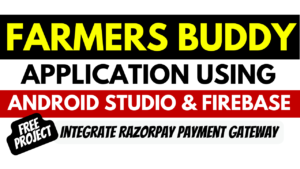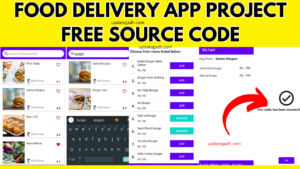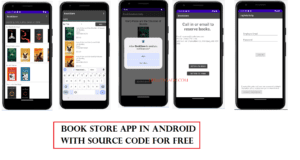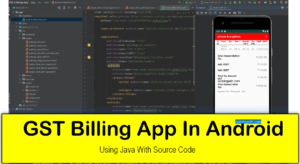Top 10 Android Project Ideas
Here are the Top 10 Android Project Ideas with descriptions
Table of Contents
Expense Tracker 💰
Description: An app that helps users manage their finances by tracking their expenses. Users can input their expenditures, categorize them, set monthly budgets, and view graphical representations of their spending habits over time.

Fitness Tracker 🏋️♀️
Description: A fitness app that monitors users’ physical activity, including workouts and daily steps. It can calculate calories burned, provide workout routines, track progress, and offer health tips.
Read More :click here
Recipe Book 🍳
Description: A recipe app with an extensive collection of recipes from various cuisines. Users can search for recipes, create shopping lists, and plan meals. They can also contribute their own recipes to the community.

Language Learning App 🗣️
Description: An app for learning new languages through interactive lessons, quizzes, and exercises. It can include speech recognition for pronunciation practice and a spaced repetition system for effective memorization.
read more : click here
Weather Forecast App ☀️
Description: A weather app that delivers real-time weather updates and forecasts. It can offer weather maps, location-based weather information, severe weather alerts, and historical weather data.
Task Manager 📝
Description: A task management app that helps users stay organized. Users can create, prioritize, and categorize tasks, set reminders, and receive notifications. It may also support task sharing and collaboration.

Music Streaming 🎵
Description: A music streaming app that allows users to listen to a vast catalog of songs, create playlists, and discover new music. It can offer features like offline listening, personalized playlists, and artist recommendations.
read more :click here
Travel Planner ✈️
Description: A travel planning app that assists users in organizing their trips. It can help users create itineraries, book accommodations, find local attractions and restaurants, and track travel expenses.
E-commerce Store 🛒
Description: A mobile e-commerce app for buying and selling products online. It should provide a user-friendly interface for product search, secure payment processing, order tracking, and user reviews.
Mental Health and Meditation 😌
Description: An app focused on mental well-being, offering meditation sessions, mood tracking, and mental health resources. It can provide relaxation techniques, guided meditation, and access to professionals or support groups.
Requirement
requirements for each of the Top 10 Android Project Ideas:
| Project Idea | Development Requirements |
|---|---|
| Expense Tracker | – User registration and authentication system. – Expense entry and categorization. – Budget setting and tracking. – Data visualization through charts or graphs. – Local or cloud storage for expense data. – Notification system for budget alerts. |
| Fitness Tracker | – Tracking sensors (e.g., GPS, accelerometer). – Workout routines and exercise library. – Calories burned calculation. – Progress tracking and charts. – Health tips and advice. – Integration with wearables (optional). |
| Recipe Book | – Recipe database with search and filters. – User recipe submission and editing. – Shopping list generator. – Meal planning calendar. – User reviews and ratings. – Ingredient conversion tool. – Image and video integration (optional). |
| Language Learning App | – Interactive language lessons and quizzes. – Speech recognition for pronunciation. – Spaced repetition algorithm. – User progress tracking. – In-app dictionaries. – Social features like language exchange (optional). |
| Weather Forecast App | – Real-time weather data from APIs. – Weather maps and visualization. – Severe weather alerts. – Location-based services. – Historical weather data access. – User customization (e.g., units, locations). |
| Task Manager | – Task creation, editing, and deletion. – Priority and due date settings. – Task categorization. – Reminder and notification system. – Task sharing and collaboration (optional). – Data synchronization across devices (optional). |
| Music Streaming | – Music catalog and metadata database. – User profiles and playlists. – Audio streaming and caching. – Personalized recommendations. – Social sharing (e.g., playlists, favorite tracks). – Offline listening (premium feature). |
| Travel Planner | – Travel itinerary creation and editing. – Accommodation booking integration. – Local attractions and restaurant recommendations. – Expense tracking and currency conversion. – Maps and navigation integration. – Weather forecast integration. |
| E-commerce Store | – Product catalog with images and descriptions. – Shopping cart and secure checkout. – User reviews and ratings. – Order tracking and history. – User profiles and authentication. – Payment gateway integration (e.g., PayPal, Stripe). |
| Mental Health and Meditation | – Guided meditation sessions. – Mood tracking and journaling. – Mental health resources and articles. – User profiles and progress tracking. – In-app support chat or access to professionals (optional). – Daily mindfulness reminders. |
Setup
Here’s the step-by-step guide to setting up your Android development environment for Top 10 Android Project Ideas
Step 1: Install Java Development Kit (JDK) 📦
Android apps are primarily developed in Java ☕ or Kotlin 🔶. Start by installing the Java Development Kit (JDK):
- Download the latest version of JDK from the Oracle website or adopt OpenJDK, which is open-source.
- Install JDK by following the installation instructions for your operating system.
Step 2: Install Android Studio 🚀
Android Studio is the official integrated development environment (IDE) for Android app development:
- Download Android Studio from the official website (https://developer.android.com/studio).
- Run the downloaded installer and follow the installation instructions for your operating system.
Step 3: Install Android SDK Components 📱
After installing Android Studio, open it and configure the SDK components:
- Click on “Configure” in the Welcome Screen and select “SDK Manager.”
- In the SDK Manager, under the “SDK Platforms” tab, select the Android versions you want to target (typically the latest stable version).
- Under the “SDK Tools” tab, select “Android SDK Build-Tools,” “Android Emulator,” “Android SDK Platform-Tools,” and other components as needed for your development.
- Click “Apply” to install the selected components.
Step 4: Set Up Android Virtual Device (AVD) 📳
To test your apps, you’ll need an Android emulator or a physical Android device:
- In Android Studio, go to “Tools” > “AVD Manager.”
- Create a new virtual device by clicking “Create Virtual Device.”
- Choose a device type (e.g., Pixel), select a system image (an Android version), and configure device specifications.
- Click “Finish” to create the virtual device.
Step 5: Configure Android Project 🛠️
Now, you’re ready to create your Android project:
- Open Android Studio.
- Click on “Start a new Android Studio project” or go to “File” > “New” > “New Project.”
- Follow the New Project wizard to configure your app’s name, package name, and other project settings.
- Select the language (Java ☕ or Kotlin 🔶) for your app.
- Choose a template, like “Empty Activity” or “Basic Activity,” or start from scratch.
- Click “Finish” to create your project.
Step 6: Explore the IDE 🕵️
Familiarize yourself with Android Studio’s interface:
- The main editor area where you’ll write code.
- The “res” folder for resources like layouts and images.
- The “java” or “kotlin” folder for your code.
- The “Gradle Scripts” for configuring dependencies and build settings.
- The “AndroidManifest.xml” file for app configuration.
Step 7: Start Coding 🖋️
Begin coding your Android app link ::
- Write your app’s logic and user interface using Java ☕ or Kotlin 🔶.
- Use the XML layout files for designing your app’s UI.
- Test your app by running it on the emulator or a physical Android device.
- Debug and fine-tune your app as needed.
Step 8: Learn and Iterate 📚
Android development is a continuous learning process:
- Refer to the official Android documentation and other online resources to learn more about Android development.
- Test your app on various Android versions and screen sizes to ensure compatibility.
- Iterate on your app, gather user feedback, and make improvements.
Thank you for reading “Top 10 Android Project Ideas” with development requirements. We hope you found these project ideas inspiring and useful for your Android app development journey. If you’re looking for more guidance or have any questions about specific project keywords or concepts, feel free to ask. Good luck with your Android app development endeavors! 🚀📱💡
- Top 40 Machine Learning Projects with Code and Documents
- Top 10 Final Year Project Ideas for IT Students
- 50 Real World React Projects for Students
- WhatsApp Contact Management
- Online Vehicle Auctions: A Comprehensive Guide with Step1st to last




